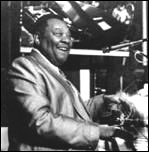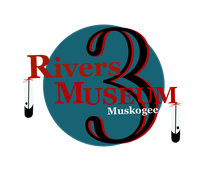The Rich Jazz Era

HUGH FOLEY saw a hole in Muskogee's past that needed filling. He won't stop now until he completes his work. His quest began several years ago when he was reading the only book written about Oklahoma's musicians " Singing Cowboys and All That Jazz." He stopped to underline the sentence "Muskogee alone would make a fascinating study."
The reference pertained in part to Muskogee's distinction of having produced nine nationally recognized jazz musicians, more than Tulsa's five and close to Oklahoma City's 12. The musicians, all African-Americans except for one, were born in Muskogee in the early part of the century between 1907 and 1923. Most of them received their training at Manual Training High School.
"The thing that distinguishes the Muskogee Musicians from others is their ability to play different styles," Foley said. He gave the example of Jay McShann, born in 1916, who started playing Kansas City barrel house jazz but slipped easily into boogie woogie, big band and even traditional music over the years. Foley met the 80-year old McShann one summer at his home in Kansas City.
"He has been called the best jazz pianist we have left, and he can still play. He credited his band teacher at Manual for his success. He said the director formed a jazz band with the students and took them out on gigs," Foley said of his meeting with McShann.
Foley also met with Claude Williams who was born in 1908 and is the leading proponent of the jazz fiddle. Williams, unlike McShann, didn't attend Manual. His family had a band that played in hotels and other places in town. Used to making money, Williams didn't want to go to school.
"Most people don't realize the rich musical heritage Muskogee has, and very little of it has been documented. It's pride that got me interested. I want people 100 years from now to know what happened here," Foley explained.
The 1979 graduate of Muskogee High School and disc jockey for 18 years left California to return to his research. Now a graduate assistant at Oklahoma State University, he decided to make the study the culmination of a doctorate degree.
"The Origin, Development, and Critical Significance of Jazz Musicians from Muskogee, Oklahoma" is the official title of the dissertation, but Foley already has a less academic title for what he hopes will eventually be published for general reading. His preference "And The Hot Times Were On."
"I got the title from a black Muskogee newspaper published in the early 1900's. It talked of a political meeting of the Lincoln Club where a fight broke out. The article said a colored marching band was playing "A Hot Time in the Old Town" when the fight started, and they didn't stop. The reporter wrote, "and the hot times were on.", Foley explained.
Foley found the "colored band" mentioned in newspapers several times. The band is one of the many unknowns that he would like to know more about.
"At this time (1995) I'm still doing course work for my degree, but I need to start talking to people who knew the musicians or know about things like the band mentioned in the article. If I don't, those things will fade and eventually be lost." Foley commented.
When he finds out more, then he might be able to better explain why so many talented musicians came from Muskogee.
"I do know one thing," Foley said. "This area was a multicultural community in the late 1800's. There was a black middle class here that only became more self-inclusive after statehood. Racism became more of an issue after 1907. And too there was Manual, which evidently was a great school, which offered a great education."
by David Gerard
(Excerpted from the Muskogee Daily Phoenix - November 19, 1995)
The reference pertained in part to Muskogee's distinction of having produced nine nationally recognized jazz musicians, more than Tulsa's five and close to Oklahoma City's 12. The musicians, all African-Americans except for one, were born in Muskogee in the early part of the century between 1907 and 1923. Most of them received their training at Manual Training High School.
"The thing that distinguishes the Muskogee Musicians from others is their ability to play different styles," Foley said. He gave the example of Jay McShann, born in 1916, who started playing Kansas City barrel house jazz but slipped easily into boogie woogie, big band and even traditional music over the years. Foley met the 80-year old McShann one summer at his home in Kansas City.
"He has been called the best jazz pianist we have left, and he can still play. He credited his band teacher at Manual for his success. He said the director formed a jazz band with the students and took them out on gigs," Foley said of his meeting with McShann.
Foley also met with Claude Williams who was born in 1908 and is the leading proponent of the jazz fiddle. Williams, unlike McShann, didn't attend Manual. His family had a band that played in hotels and other places in town. Used to making money, Williams didn't want to go to school.
"Most people don't realize the rich musical heritage Muskogee has, and very little of it has been documented. It's pride that got me interested. I want people 100 years from now to know what happened here," Foley explained.
The 1979 graduate of Muskogee High School and disc jockey for 18 years left California to return to his research. Now a graduate assistant at Oklahoma State University, he decided to make the study the culmination of a doctorate degree.
"The Origin, Development, and Critical Significance of Jazz Musicians from Muskogee, Oklahoma" is the official title of the dissertation, but Foley already has a less academic title for what he hopes will eventually be published for general reading. His preference "And The Hot Times Were On."
"I got the title from a black Muskogee newspaper published in the early 1900's. It talked of a political meeting of the Lincoln Club where a fight broke out. The article said a colored marching band was playing "A Hot Time in the Old Town" when the fight started, and they didn't stop. The reporter wrote, "and the hot times were on.", Foley explained.
Foley found the "colored band" mentioned in newspapers several times. The band is one of the many unknowns that he would like to know more about.
"At this time (1995) I'm still doing course work for my degree, but I need to start talking to people who knew the musicians or know about things like the band mentioned in the article. If I don't, those things will fade and eventually be lost." Foley commented.
When he finds out more, then he might be able to better explain why so many talented musicians came from Muskogee.
"I do know one thing," Foley said. "This area was a multicultural community in the late 1800's. There was a black middle class here that only became more self-inclusive after statehood. Racism became more of an issue after 1907. And too there was Manual, which evidently was a great school, which offered a great education."
by David Gerard
(Excerpted from the Muskogee Daily Phoenix - November 19, 1995)
Muskogee's Regional Heritage CenterWith Assistance from the City of Muskogee
(c) 2024 Three Rivers Museum
|
FInd-Contact-connectMuseum Hours Facebook
Wednesday-Saturday 10 a.m.-5 p.m. Newsletter/Mailing List Contact Info 220 Elgin Muskogee, OK 74401 918-686-6624 [email protected] |
